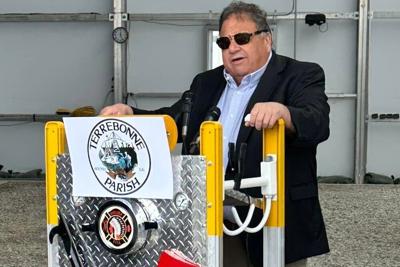
Gordon Dove is chairman of the Coastal Protection and Restoration Authority.
Louisiana officials have halted midstream a $3 billion project that was designed to divert sediment from the Mississippi River to help rebuild the eroded wetlands in the Barataria Basin.
The cancellation of the Mid-Barataria Sediment Diversion (MBSD) Project was announced July 17 by the Coastal Protection and Restoration Authority (CPRA) through an agreement with another group, the Louisiana Trustee Implementation Group. The latter organization has advanced projects using the legal settlement funds from the 2010 BP oil spill in the Gulf of Mexico.
The CPRA has reported that the diversion project was no longer practical – after more than $600 million was spent on it – as a result of several factors, such as high costs, the suspension of a federal permit by the U.S. Army Corps of Engineers and ongoing civil litigation.
“After years of planning and navigating significant legal and permitting challenges, we’ve made the difficult decision to terminate the Mid-Barataria project,” CPRA Chairman Gordon Dove said in a prepared statement. “However, our commitment to coastal restoration has not wavered. We are now focused on advancing the Myrtle Grove project, which we believe will deliver similar benefits to rebuild and sustain our coast, in addition to numerous other master plan and annual plan projects.”
The Myrtle Grove project is a dredging proposal that offers similar restoration benefits as the Mid-Barataria project to help restore the state’s disappearing coastal wetlands.
Another group, the statewide nonprofit Coalition to Restore Coastal Louisiana (CRCL), indicated that the Mid-Barataria project’s cancellation raises important questions about how the state will now deal with the severe, rapid loss of its wetlands.
“CRCL is ready to talk about what is possible, rather than lamenting what is not,” James Karst, the CRCL spokesman, said in an email to the Louisiana Record. “We must continue to dredge and to undertake other sorts of restoration projects, even while we have decided not to use the most powerful tool for building land in Plaquemines Parish. Upriver, thankfully, projects to reconnect the river to wetlands continue.”
The CPRA has stressed that any unused Mid-Barataria project funds may be transferred to restoration efforts in the future that are funded through the Deepwater Horizon settlement.
In a statement on X earlier this week, Gov. Jeff Landry said the sediment diversion project was no longer viable, either practically or financially.
“Beyond the financial concerns, the MBSD threatens Louisiana’s seafood industry, our coastal culture and the livelihoods of our fishermen – people who have sustained our state for generations,” Landry said. “@LouisianaCPRA is now moving forward with another coastal restoration plan – one that balances our environmental goals with the needs of all citizens, businesses and industries.”
Earlier this year, the governor said the project would cost taxpayers $50 million annually in dredging, affect drinking water in Jefferson, Plaquemines, St. Bernard and Orleans parishes, and degrade fisheries in the coastal region.
“We’re forever appreciative of Gov. Landry for his leadership and commitment to due diligence – for not buckling under pressure and instead reviewing the science to make a sound, reality-based decision to permanently halt the Mid Barataria Sediment Diversion,” the Louisiana Oyster Task Force said in a statement on Facebook.
Last year, commercial fishing groups in the state and conservationists filed a federal lawsuit to halt the diversion project, arguing that it would transfer fresh water and toxins into saline waters, likely putting a halt to local fishing operations.




